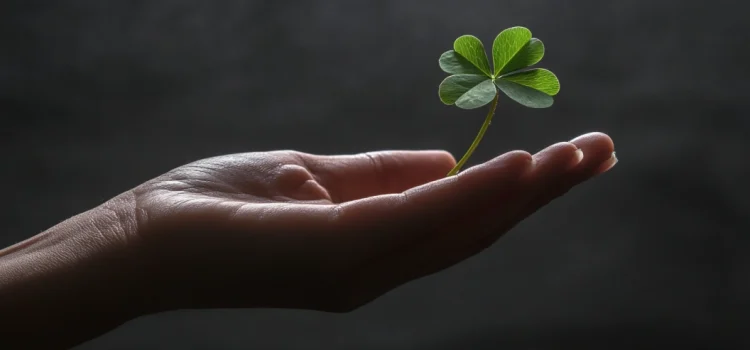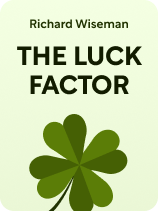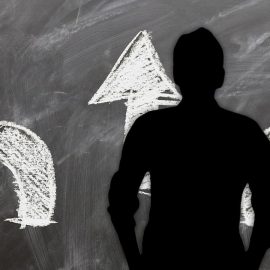

This article is an excerpt from the Shortform book guide to "The Luck Factor" by Richard Wiseman. Shortform has the world's best summaries and analyses of books you should be reading.
Like this article? Sign up for a free trial here.
Do you believe in luck? Do you think you’re lucky or unlucky? How might your beliefs change your reality?
Psychologist Richard Wiseman performed scientific studies around luck and determined that those who believe in luck tend to have better outcomes in life. Rather than there being a magical force behind luck, it can all be explained with psychology.
Here’s a breakdown of why you should believe you’re lucky.
Psychology of Believing in Luck
The first psychological characteristic that defines both lucky and unlucky people is that they believe they’re lucky or unlucky. Put another way, some people look to the future favorably, while others see only doom and gloom. Whichever side of the line you fall on, you probably attribute your beliefs to past experience without realizing the degree to which your expectations shape your experience. Wiseman writes that a positive outlook—feeling “lucky”—energizes how you tackle the future in ways that a negative outlook cannot.
(Shortform note: Even without believing in luck, many self-empowerment experts agree that expectations determine reality, which is why choosing your expectations is important. In Energize, Simon Alexander Ong writes that having a specific, long-term vision lets you focus your energy toward your most important goals, just as athletes imagine future victories while practicing the skills to achieve them. Ong says one way to build a vision for yourself is to imagine meeting an old friend in the future and telling them everything you’ve achieved in that time. To apply this to Wiseman’s principles about luck, you might describe to your imaginary friend all the good luck you’ve had in the intervening years to come.)
Playing the Numbers
Wiseman notes that people who feel lucky don’t see luck as a one-time occurrence. For instance, if they make a new friend at a sporting event by striking up a conversation with a stranger, they’ll tend to repeat that behavior in the future, expecting a similar outcome and statistically raising the chances of one. Wiseman finds that this type of positive belief is so ingrained in lucky people that even when their hopes aren’t met, they view it as a temporary glitch. Conversely, people who feel they’re unlucky expect something bad to follow anything good—if they meet one friendly person, they expect the next one to be a jerk. Therefore, they won’t seek to recreate a past success, preventing any possible good luck in the future.
(Shortform note: Wiseman isn’t alone in arguing that positive beliefs lead to positive outcomes, but not everybody agrees. In Happy, Derren Brown asserts that positive thinking proponents oversell its benefits while encouraging people to fool themselves in the face of unpleasant realities. For Brown, the worst aspect of positive thinking is that if it fails to produce the desired results, it shifts the blame for its failure onto you. For example, if believing in luck doesn’t make you successful, you may feel it’s your fault for not believing hard enough. Brown argues that the shame cycle trap undermines any rewards from positive thinking, though Wiseman’s research only identified feelings of shame and regret in people with negative mindsets toward their luck.)
Another point to consider is that people who believe in their own luck are more persistent than those who think that luck is against them. Wiseman’s research shows that self-proclaimed lucky people are more likely to enter competitions, spend more time trying to solve difficult problems, and pursue challenging career opportunities. Their belief in their luck makes them lucky in the sense that it gives them more time and opportunities to succeed. On the other hand, people who expect disappointment will actively minimize their chances for success by avoiding situations in which they might lose, from poetry contests to job interviews. The cumulative effect of persistence—or its lack—will self-confirm your beliefs about your luck.
(Shortform note: Wiseman describes persistence as a luck-promoting trait, but in Grit, psychologist Angela Duckworth argues that persistence and perseverance are better at determining success than luck. “Grit,” which she defines as perseverance plus passion, is the one characteristic that successful people have in common—not luck. Like Wiseman, Duckworth finds no correlation between intelligence and success, but Duckworth’s research ignores luck as a factor beyond mere randomness. Unlike Wiseman, Duckworth found that the most successful people aren’t those who think they’re lucky—instead, they’re the ones who are never complacent and the thought of giving up rarely crosses their mind.)
Networking for Luck
Wiseman’s final point about believing in your luck is that people who expect lucky outcomes in life tend to be more positive when they interact with others. As a result, others are more positive in return, increasing your chances of making new friends, networking with your peers, and making lucky connections that can enhance your life. For instance, suppose your roof starts to leak. If you’re a lucky-minded person, you’re more likely to connect and be open with many people, raising the odds of meeting someone who knows a roofer willing to give a discount to their friends. Your belief in luck makes having luck more likely, which will only reinforce your beliefs and create more opportunities for random chance to turn in your favor.
(Shortform note: Wiseman’s point about people creating luck through large personal networks holds water from a statistical perspective, but from a sociological point of view, there’s a limit to how large an effective network can be. In The Tipping Point, Malcolm Gladwell explains that we each have a limited capacity for close relationships. On a community level, people can maintain some kind of social relationship with about 150 other people. These groups develop a joint memory system in which each person organically becomes the resident expert on one topic or another—that “lucky connection” Wiseman says you might bump into. Beyond the 150-person limit, however, smaller groups break off in which all members of the group know each other.)

———End of Preview———
Like what you just read? Read the rest of the world's best book summary and analysis of Richard Wiseman's "The Luck Factor" at Shortform.
Here's what you'll find in our full The Luck Factor summary:
- The unconscious methods lucky people use
- The benefits of trusting your intuitive hunches
- The scientific explanation as to whether or not luck is real






